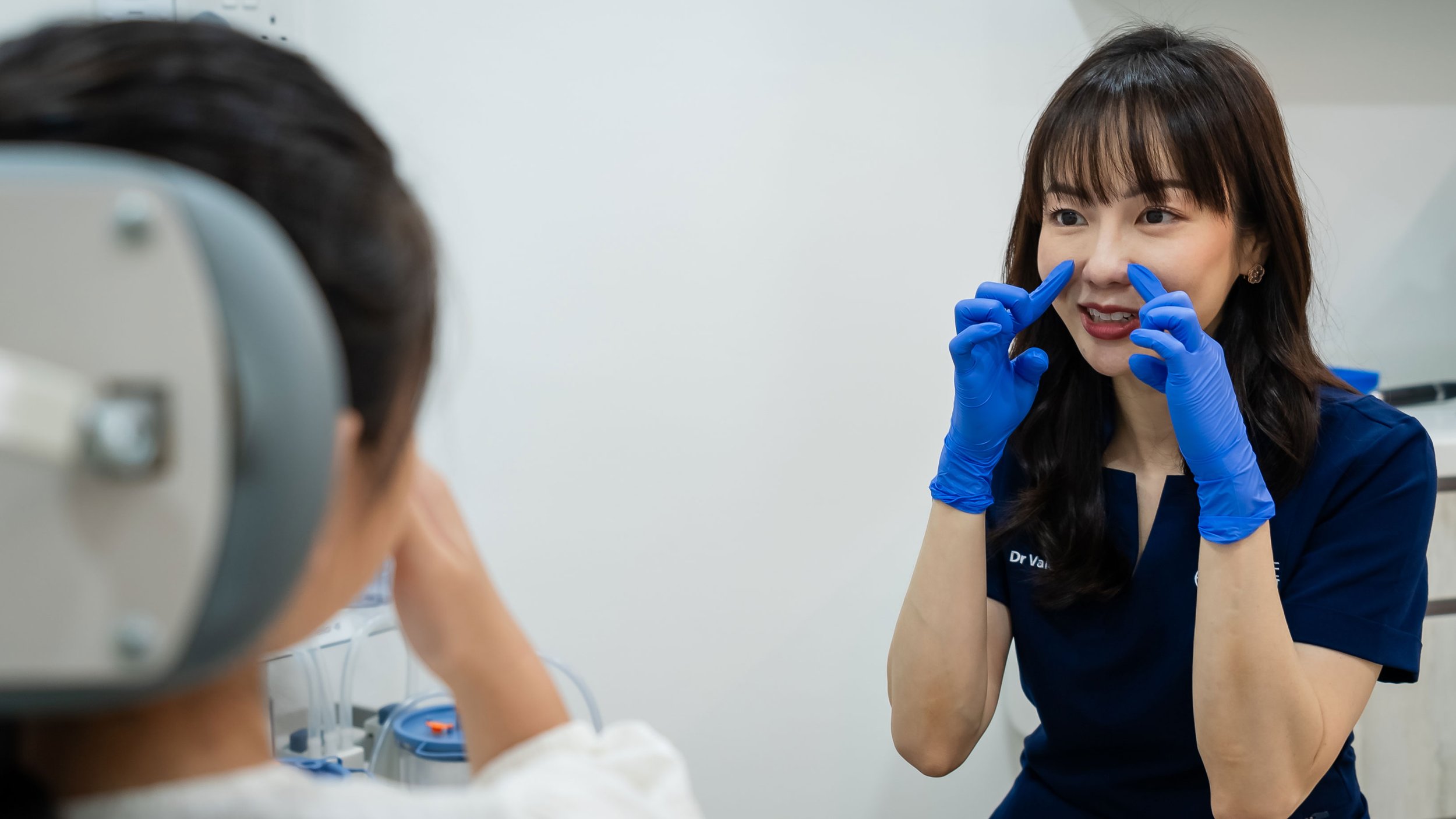
NOSE & BREATHING PROBLEMS
Quick Navigation
Allergic Rhinitis
What is Allergic Rhinitis?
Imagine your nose responding with a sneeze or running every time you encounter dust, pollen, or your pet's dander - that's allergic rhinitis! It's your nose throwing an allergy party with swollen tissues and lots of mucus. You might also experience a stuffy nose.
This condition occurs when your body's immune defence releases histamine. In the case of allergic rhinitis, histamine inflates the blood vessels in your nose, causing it to swell and produce extra mucus. You might also experience a stuffy nose.
Symptoms of Allergic Rhinitis
Symptoms of allergic rhinitis can often mimic those of a common cold but can be more persistent. You may experience:
Continuous sneezing
Runny or blocked nose
Watery, itchy eyes
Fatigue
If you are suspected to have allergic rhinitis, Dr Valerie Tay will perform a Flexible Nasoendoscopy - a fancy way of saying she'll use a flexible camera tube to take a close look inside your nose and throat.
Treatment of Allergic Rhinitis
Treating allergic rhinitis involves a number of approaches.
First, recognise what sets off these reactions, known as allergens, ranging from microscopic dust mites, pet hair, or even specific types of pollen. Once you know your triggers, you can avoid them and reduce your symptoms significantly.
When steering clear of allergens isn't enough, medications, like intranasal steroids and antihistamines, can help by reducing inflammation and keeping symptoms in check.
If you have already tried multiple medications with little improvement, a new minimally invasive device called ClariFix that can stop your runny nose without medications may suit you.
Understanding and managing allergic rhinitis can lead to a significant improvement in your quality of life. Contact Aspire ENT to discuss the best treatment plan for you.
Deviated Nasal Septum
What is a Deviated Nasal Septum?
Picture a thin wall that divides your nasal passages, like a centre line running down a road; that's the nasal septum. Ideally, it evenly divides your nose into equal passages. However, if this line swerves to one side, making one passage narrower, you have a deviated septum.
Symptoms of a Deviated Nasal Septum
A deviated nasal septum often goes undetected. A majority of people with this condition don't experience any noticeable symptoms. However, if your deviated nasal septum is more pronounced, you might observe:
Difficulty breathing - like trying to inhale through a straw due to blocked nostrils. This is especially noticeable when a cold or allergies cause your nasal passages to swell.
Frequent nosebleeds - provoked by the drying out of the skin over the nasal septum.
Noisy breathing while sleeping – because of the turbulent airflow through the nose in the presence of a deviated septum
A particular sleeping preference - favouring one side to breathe more comfortably, given the narrowing of one nasal passage
If you're experiencing any of these, it's time to consult Dr Valerie Tay. She is your trusted partner in navigating through these breathing difficulties towards a healthier, better life!
Treatment for Deviated Nasal Septum
We may first prescribe medications for symptom relief:
Decongestants to reduce swelling in your nasal tissue
Antihistamines to prevent allergy symptoms
Nasal steroid sprays reduce swelling in your nasal passage and help with drainage
Please note, these won't correct a deviated nasal septum but may reduce the symptoms. If medications do not help, you might need surgery.
Surgery Options for a Deviated Septum
What is Septoplasty?
When medical management isn't enough to alleviate your nasal symptoms, you might consider a surgical procedure known as Septoplasty. This procedure involves the meticulous straightening and repositioning of your nasal septum.
The level of improvement you can expect is directly related to the severity of your septum deviation. Complete relief from symptoms like nasal obstruction is possible. However, it's important to note that Septoplasty alone cannot cure other nasal or sinus conditions affecting your nose, such as allergies.
What is Septorhinoplasty?
When your external nasal structure contributes to nasal obstruction and septum deviation, a different surgical procedure, known as septorhinoplasty, might be recommended. This involves modifying your nose's external bones and cartilage to change its shape or size.
Breathe well, Sleep well and Live well. Trust Dr Valerie Tay's expertise and contact her today to improve your quality of life by correcting your deviated nasal septum.
Acute Sinusitis
What is Acute Sinusitis?
Imagine having a cave system in your skull. These are your sinuses, air-filled pockets within the bones of your face. Acute Sinusitis is like a storm in these caves, causing inflammation and infection that can last up to four weeks.
Symptoms of Acute Sinusitis
When Acute Sinusitis hits, it's hard to ignore. The telling signs are:
Thick yellowish mucus from the nose
Loss of smell
Nasal obstruction
Facial pain around the eyes, cheeks and forehead
Headaches
Fever
Cough
Post nasal drip
Bad breath
Treatment for Acute Sinusitis
Dr Valerie Tay, an experienced ENT specialist, will carefully evaluate your symptoms and may run some tests to get a more precise picture. These investigations can include a nasendoscopy (an examination of the nasal and upper airway passages using a flexible, thin tube with a camera and light at the end to look inside your nose and sinuses), CT scans, and nasal and sinus cultures, if required.
Acute sinusitis is usually addressed with a host of medical treatments. These may include oral antibiotics, intranasal steroids, oral steroids, nasal decongestants, nasal douches, and mucolytics.
However, if these treatments don't bring relief, Dr Valerie Tay will guide you to the next step. You may require Functional Endoscopic Sinus Surgery (FESS) to open up your sinus passages to remove the infected mucus and allow the paranasal sinuses to drain effectively.
Trust Dr Valerie Tay to help you navigate your way to better health. Book an appointment today and start your journey to relief from acute sinusitis.
Don't let ENT conditions hold you back.
Connect with us at Aspire ENT clinic today, and take the first step towards a better quality of life.
If you are experiencing any concerns related to your Ear, Nose, or Throat health, contact us at Aspire Ear, Nose Throat and Snoring Clinic. Dr Valerie Tay is here to help you breathe well, sleep well, eat well, and live well.
Aspire Ear, Nose, Throat and Snoring Clinic
Mount Elizabeth Medical Centre #06-10,
3 Mount Elizabeth, Singapore 228510
Opening Hours (by appointment only)
Monday to Friday: 9 AM to 4.30 PM
Saturday: 9 AM to 12 PM
Sunday and Public Holidays: Closed
Contact Details
Tel: +65 6592 2118
Mobile: +65 9358 8060
Email: enquiry@aspire-ent.com



